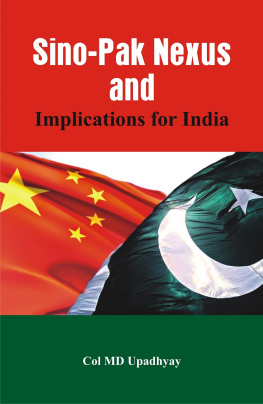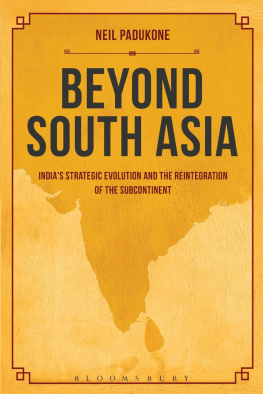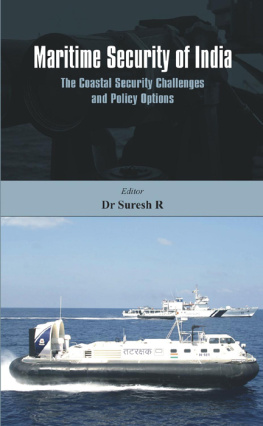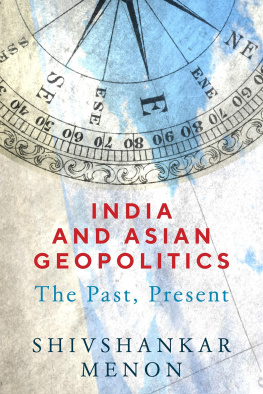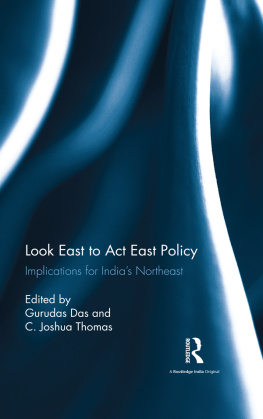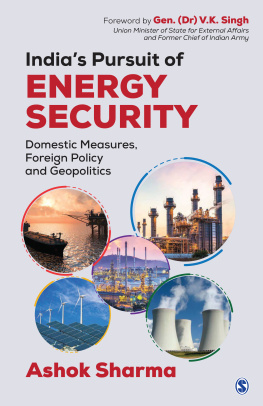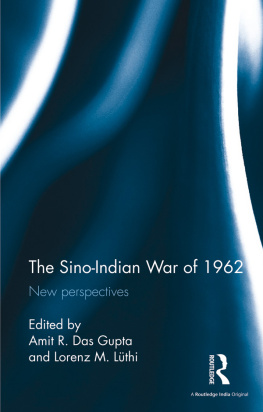Global Security WatchIndia
Amit Gupta

Copyright 2012 by Amit Gupta
All rights reserved. No part of this publication may be reproduced, stored in a retrieval system, or transmitted, in any form or by any means, electronic, mechanical, photocopying, recording, or otherwise, except for the inclusion of brief quotations in a review, without prior permission in writing from the publisher.
Library of Congress Cataloging-in-Publication Data
Gupta, Amit, 1958
Global security watchIndia / Amit Gupta.
p. cm. (Global security watch)
Includes bibliographical references and index.
ISBN 978-0-313-39586-4 (hardcopy : alk. paper) ISBN 978-0-313-39587-1 (e-book) 1. IndiaForeign relations. 2. National securityIndia. I. Title.
DS449.G87 2012
355'.033054dc23 2012020976
ISBN: 978-0-313-39586-4
EISBN: 978-0-313-39587-1
16 15 14 13 12 1 2 3 4 5
This book is also available on the World Wide Web as an eBook.
Visit www.abc-clio.com for details.
Praeger
An Imprint of ABC-CLIO, LLC
ABC-CLIO, LLC
130 Cremona Drive, P.O. Box 1911
Santa Barbara, California 93116-1911
This book is printed on acid-free paper 
Manufactured in the United States of America
Contents
Preface
International observers looking into the future see China, the United States, and India as the worlds largest economies, and these analysts assume that with the rise of India and China there will be a corresponding growth in these countries military capabilities and their foreign policy interests. Indias rise to power, however, is dependent on its ability to resolve its internal challenges as well as its willingness to participate as a stakeholder in the international systemparticularly in what has been described as the Indo-Pacific region.
Internally, India will have to create an economy that is sound enough to successfully absorb the large mass of youth that comprise more than 50 percent of the nations population. In part, this absorption will require genuinely effective poverty reduction programs that can lift more than 300 million Indians out of abject poverty. The other part is to continue policies that educate young Indians and successfully integrate them into the global economy. Both of these steps will require overhauling the education system to train a working-age population that can meet the requirements of a rapidly evolving global economy. Additionally, India will have to continue the policies that encourage market reforms and lead to an economy that is increasingly innovative and globally competitive. In a globalized world, moreover, the economic development of India rests on reshaping or modifying its bilateral relationships with several nations as well as creating opportunities in an increasingly complex and integrated international system. For India, its most important relationships are with Pakistan, China, the United States, and, primarily from a military perspective, Russia.
Pakistan remains a security concern for India because of its ability to carry out nonstate violence in India through various terrorist groups, and there remain doubts about the stability of the nuclear balance in South Asia. For India, the security dilemma remains how to convince Pakistan to not support terrorist groups and to work toward stabilizing the nuclear balance without conceding significant concessions on the Kashmir issue. It has been argued that India will, in fact, be unable to play a major role in international affairs unless it is able to successfully move its relationship with Pakistan to a less hostile one. While this author disagrees with that belief, the fact remains that Indian policymakers remain concerned about Pakistan and make it a central focus of the nations foreign and security policy.
While Pakistan continues to create problems for India, it is China that is emerging as the major challenger to New Delhi in the international system. A nearly 50-year-old territorial dispute, the arming of Pakistan (which includes the transfer of nuclear and missile technology), concerns about China locking down energy supplies globally and preventing India from accessing them, and Chinas reluctance to support Indias accession to permanent membership of the United Nations Security Council are among the reasons India believes that China will not allow India to achieve its rightful place as a major power in Asia. Indias options for dealing with China are either to engage in a costly arms race that allows it to match Beijings military prowess or to seek alliances that help India to balance off China. Indian developmental priorities will not permit the first, while residual Indian worries about violating its nonaligned position as well as a real concern that it would anger China and precipitate action by Beijing make the second option difficult. Yet, if India has to continue with its economic development and reinforce its security, it will have to make this hard choice. The third alternative is one where the two countries can resolve their security differences as well as their contradictory worldviews to cement their bourgeoning economic relationship. The fact that both countries have a rapidly growing trade relationship and are cooperating in multilateral forums like the BRICs summits are examples of the future basis for a political relationship. Foreign policy optimists in India believe that such an accommodation of interests is possible, while the more pessimistic would suggest it will likely make India into a state that is subordinate to China.
Given the need to balance China, the United States becomes the most logical partner for future Indian foreign policy endeavors. Similar values, increasingly common perspectives on international security issues, worries about future Chinese intentions, and the need for U.S. technology to forward Indian developmental and defense efforts make it likely that the IndiaU.S. relationship will flourish in the coming decades, leading perhaps to a true strategic partnership. Many within the Indian polity, foreign policy circles, and academia, however, view such an alliance as constraining Indian autonomy in the international system and making India into a junior partner of the United States. How to increase the density of the relationship while maintaining autonomy is, from an Indian perspective, the major challenge to the evolution of the relationship. India is working through increased military contacts and the procurement of certain types of weaponry to improve its ability to plug and play with the United States in the area of military operations. At the same time, the foreign policy concept of a strategic partnership is fluid enough to allow both countries to pick and chose where and when they seek to work with each other to achieve certain security outcomes. What issues they seek to work together on remain to be seen.
While the United States is becoming a significant supplier of weapons systems to India and a new political partner, Russia remains a major arms supplier but a diminished political ally to New Delhi. Russia has transformed the IndiaRussia military relationship from a political alliance into a cash-and-carry economic transaction, and to hold on to the Indian market, as well as safeguard its own industry, Moscow has agreed to transfer systems to India that it would not give to other nationsincluding the leasing of two Akula nuclear submarines. Yet, despite such significant arms sales, IndiaRussia bilateral trade was under $9 billion in 2011 and will never touch the volume that exists between India and the more economically dynamic regions of the world. Politically, a diminished Russia does not fit into New Delhis future plans for regional order in the Indo-Pacific region.




